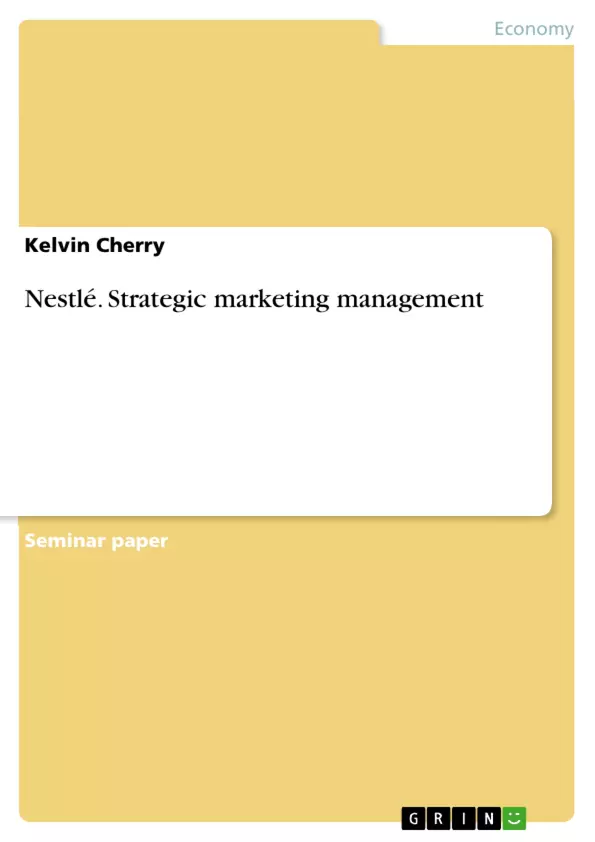In this assignment there is a discussion of strategic marketing management that how it plays an important role. Strategic marketing tools are essential to play game; there are different strategies and techniques of marketing. There is a best fit relation between corporate strategy and marketing strategy. There is a discussion of different analysis model for the positioning and growth. Nestle has been used an example of strategic marketing management because of its standard and leadership in food industry (...)
Marketing is a game and there are strategic tools which are needed for playing the game between buyers and sellers where they exchange values for the satisfaction which results in profitability.
Table of Contents
- Executive Summary
- Introduction
- Strategic Marketing in an Organization
- Strategic Marketing Process
- VMV
- Goals and Objectives
- External Analysis
- Internal Analysis
- Tools
- Strategic Analysis
- Media Plan
- Distribution Channels
- Financial Plan
- Link Between Strategic Marketing and Corporate Strategy
- Value of Strategic Marketing Planning Models
- Ansoff Matrix
Objectives and Key Themes
This text examines the role of strategic marketing management in achieving business goals and explores its connection to corporate strategy. It uses Nestlé as a case study to illustrate key concepts and practices.- Strategic Marketing Tools and Techniques
- The Importance of a Holistic Marketing Approach
- The Relationship between Corporate Strategy and Marketing Strategy
- Analysis Models for Market Positioning and Growth
- The Application of Strategic Marketing Principles in a Real-World Context
Chapter Summaries
- Executive Summary: This section provides a concise overview of the paper, highlighting the importance of strategic marketing management and the use of Nestlé as a case study.
- Introduction: This section introduces the concept of marketing as a game requiring strategic tools to facilitate value exchange between buyers and sellers.
- Strategic Marketing in an Organization: This section delves into the traditional and extended "P's" of marketing (product, price, place, promotion, people, process, and physical evidence) and the four "C's" (customer solution, customer cost, convenience, and communication). It emphasizes the importance of integrating these elements for a holistic marketing approach. The section also highlights Nestlé's commitment to long-term marketing planning and its focus on the four "P's."
- Strategic Marketing Process: This section outlines the process an organization undergoes to develop marketing strategies and plans. It explores the VMV framework (Values, Mission, Vision), the definition of goals and objectives, and the importance of external and internal analysis. It then details Nestlé's specific values, mission, and vision, as well as its goals and objectives. It also explains the SWOT analysis, demonstrating its application to Nestlé's strengths, weaknesses, opportunities, and threats.
- Link Between Strategic Marketing and Corporate Strategy: This section discusses the close relationship between corporate strategy and marketing strategy, emphasizing how achieving corporate goals depends on effective marketing strategies. It highlights how Nestlé's corporate strategy of attaining a top position in the food industry aligns with its marketing goal of creating long-term value for its products.
- Value of Strategic Marketing Planning Models: This section introduces the Ansoff Matrix as a valuable tool for segment targeting, explaining the different growth strategies it identifies: market penetration, product development, market development, and diversification.
Keywords
The core focus of this work centers on strategic marketing management, encompassing concepts like holistic marketing, corporate strategy, marketing strategy, market positioning, growth models, and the application of these principles in a real-world context through the case study of Nestlé. Key terms include the 4 Ps and 4 Cs, SWOT analysis, Ansoff matrix, and value creation.Frequently Asked Questions
What is the role of strategic marketing management at Nestlé?
At Nestlé, strategic marketing aligns with corporate goals to maintain leadership in the food industry by creating long-term value and positioning products effectively.
How does Nestlé use the SWOT analysis?
Nestlé uses SWOT to identify its internal strengths and weaknesses while evaluating external opportunities and threats in the global food market.
What is the Ansoff Matrix and how is it applied?
The Ansoff Matrix is a tool for growth strategies, including market penetration, product development, market development, and diversification, used by Nestlé for segment targeting.
What are the 7 Ps of marketing discussed in the text?
The extended marketing mix includes Product, Price, Place, Promotion, People, Process, and Physical Evidence.
What is the difference between the 4 Ps and the 4 Cs?
The 4 Ps (Product, Price, Place, Promotion) focus on the seller's perspective, while the 4 Cs (Customer solution, Customer cost, Convenience, Communication) focus on the buyer's perspective.
- Arbeit zitieren
- Kelvin Cherry (Autor:in), 2011, Nestlé. Strategic marketing management, München, GRIN Verlag, https://www.hausarbeiten.de/document/271465


